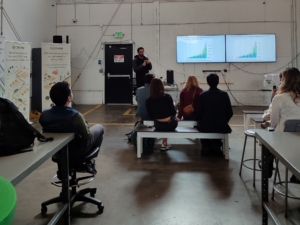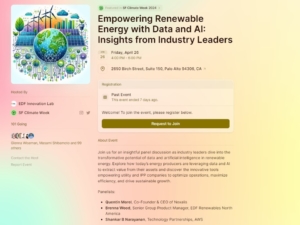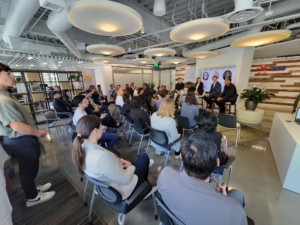In April 2024, the SF Climate Week brought together industry leaders, innovators, investors, and experts from around the US to tackle the most pressing issue of our time: climate change. This year’s events featured visits to climate removal facilities, showcases of climate tech startups, energy debates, generative AI hikes, and more. As attendees delved into a wide range of topics, they were offered a great opportunity to follow the latest developments in climate and in particular get a good snapshot of what are the most prominent topics of 2024 in climate tech. Unsurprisingly many conferences focused on the latest AI applications in the sector but other topics such as batteries as well as EVs, grid enhancements, and carbon capture were also the focus of many events.

Amidst this environment of progress and innovation, EDF decided to contribute and share lessons learned as an industry leader by hosting a cross-panel discussion on one of the major challenges facing the energy sector: the importance of data standardization and accurate use of AI. Featuring Quentin Morel, Smart Grid Director at the US Innovation Lab of EDF, and Co-founder of Nexalis a recently created EDF spin-off for energy data standardization, Brenna Woods, Senior Group Product Management at EDF Renewables North America, and Shankar Narayanan, Technology Partnerships & Sales Leader at AWS, this panel aimed at confronting the insights of both operators, technology providers and data solutions experts on such prevalent topic.
The Challenge for Operators: Siloed Data and Inefficient Operations
As a global leader and established player in renewable energy, EDF Renewables has achieved rapid growth in the American market. However, the incremental addition of new assets over the years has led to a proliferation of siloed data and an outdated data architecture. With thousands of manufacturers and complex data access for Independent Power Producers (IPPs), the complexity is high and the process of tackling this problem is time-consuming. In California only, there are over 1,500 different solar inverter models, themselves creating a giant pull of different types of data to be analyzed. Such changes have made it difficult for companies like EDF Renewables to get a comprehensive picture of operations and to efficiently operate their asset portfolio in real time.
“In the end what it means is you need to pay to hire engineers to clean, process, and map the data before you get any value. So, this is a pretty big challenge for the industry right now” explained Brenna Woods, senior group product manager at EDF Renewables. The need for better data standardization that would enable any data to be precisely formatted and easily analyzable is more than ever present in a market where controlling its data without excessive resource expenditures is key to leveraging new AI and digital solutions.

The Solution brought by Tech providers and Data experts: Leverage AI for Data Standardization
To address this challenge, EDF Renewables has turned to the GeneSys team (tool developed by EDF R&D), which is now commercialized in the US by Nexalis, an EDF spin-off. The company is partnering with AWS to connect to any solar or wind asset and standardize industrial information into a unique data model. The startup exposes an API in the cloud, leveraging AWS infrastructure and microservices to ingest and standardize data. Nexalis AI tools can now automate mapping to the data model, using the latest generative and LLM AI for a clean data structure.
The company’s ability to connect to the grid and renewable assets has gained a lot of traction recently, showing that the need in the industry is real. One of the keys to Nexalis’ success, as was highlighted by its AWS partner, was understanding that the renewable energy sector deals with critical infrastructure and has a low-risk appetite that requires extremely accurate and precise data. The startup is currently the only company focusing exclusively on data accuracy and standardization for industry productivity while other solutions provide wider but more general data analysis services. “By standardizing data, we can reduce costs by up to 75% when combined with AI, and even achieve 90% cost reduction in some cases” shared Quentin Morel, co-founder of Nexalis. “By leveraging Nexalis and AWS, we can optimize our assets, reduce costs, and accelerate the transition to renewable energy sources” added Brenna Woods from EDF Renewables.
Industry opportunities and challenges in AI and data usage
AWS Technology partnership and sales leader, Shankar Narayanan indicated that Nexalis is a good example of the ongoing industry shift in the approach to data and AI, going from monolithic to microservice to allow everybody to own its data. This shift driven by the emergence of generative AI emphasizes the need for a bigger amount of more accurate data. Better data accuracy and new tools leveraging AI are expected to unlock big opportunities in many markets including renewable energy as operators will be able to obtain answers more rapidly. The development of specialized services catering to diverse needs, combined with improvements in computing power, will all contribute to this success.
However, some constraints remain to be able to provide full data standardization. For starters, the battery storage market is accelerating, but manufacturers are not yet willing to open up their data. This is a real challenge, and all speakers agreed that industry pressure is going to be needed to address it. Improving cybersecurity and engaging all stakeholders will also be top priorities when leveraging AI tools according to Shankar Narayanan, especially when dealing with critical infrastructure like power plants. Last but not least, many businesses will be trying to implement AI in their models at any cost, without addressing a specific need, according to the AWS executive. To avoid unnecessary spending of resources, it will be imperative in the future that investments be allocated to AI solutions, like Nexalis, that are conceived while looking at a particular existing problem.

Overall, the SF Climate Week 2024 events and EDF panel discussion have reaffirmed that tech and in particular AI and data have their very own part to play in fighting climate change. As the energy industry continues to evolve, prioritizing data accuracy and standardization, robust cybersecurity, and inclusive stakeholder engagement will be essential for a sustainable future. Collaborative events like the SF Climate Week will also play a crucial role in facilitating cooperation and knowledge sharing among diverse actors. In the end, if admittedly the Bay Area may be overly tech-optimistic, seeing such a concentration of innovations and people putting their skills and energy into fighting climate change may encourage all of us to be part of the transition to a low-carbon economy and inspire more than one.
Garance Martin – Open Innovation Analyst

